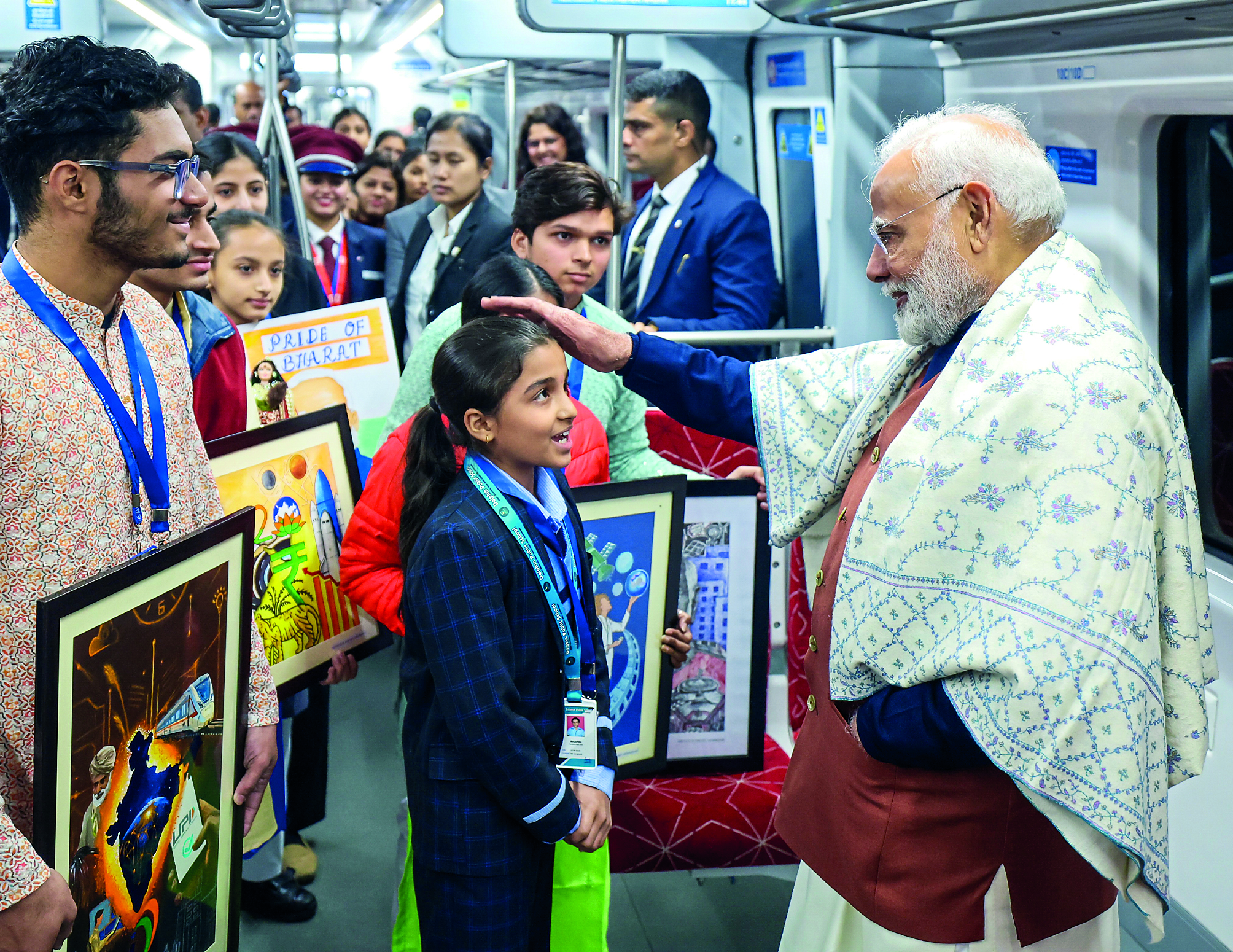PM promises welfare schemes will continue if BJP forms govt in Delhi

New Delhi: Prime Minister Narendra Modi’s rally in Rohini on Sunday drew large crowds and sharp political discourse, a day after the Delhi BJP released its first list of candidates for the upcoming Delhi Assembly elections. Addressing the gathering, Modi launched a scathing attack on the Aam Aadmi Party (AAP) government, branding it a “disaster” for the national capital and urging voters to support a “double-engine government” to bring tangible progress to Delhi.
Modi reassured Delhiites that welfare schemes would continue under BJP rule but warned of action against corruption in their implementation. “No welfare scheme will be stopped, but dishonest contractors will be shown the door,” he declared.
Earlier in the day, Modi inaugurated several projects in the city worth Rs 12,200 crore.
He inaugurated a 13-km section of the Delhi-Meerut Regional Rapid Transit System (RRTS) corridor from Sahibabad in Ghaziabad to New Ashok Nagar here. The inauguration of key infrastructure projects also included the Janakpuri West-Krishna Park Extension section of Delhi Metro Phase IV and the foundation stone for the Rithala-Narela-Kundli corridor.
“Highways are being developed, the Metro network is expanding, and new hospitals are being built. However, once you step out of the Metro, you encounter potholed roads and overflowing sewers. This reflects the city’s dire condition under the current government,” he stated.
Emphasising the need for synergy between the Centre and a BJP-led state government, Modi assured, “Only when this ‘AAPDa’ (disaster) is removed can Delhi truly progress. The double-engine government will transform the city.”
A significant highlight of the rally was a replica model of Delhi’s former Chief Minister Arvind Kejriwal’s renovated official residence—branded “Sheesh Mahal” by the BJP. The model attracted widespread attention, symbolising the ongoing debate over the alleged misuse of public funds. Modi criticised the AAP government, saying, “When people were struggling for oxygen and medicines during Covid, their focus was on creating Sheesh Mahal. The CAG report shows how a budget of Rs 7.91 crore ballooned to Rs 33.66 crore. This exposes their priorities.”
The Comptroller and Auditor General’s (CAG) report, yet to be tabled in the Delhi Assembly, reportedly highlights irregularities in the project, including frequent budget revisions and the inclusion of higher-specification items. The AAP has defended the renovation, asserting that the property belongs to the government and will serve as the CM’s residence for future occupants. However, Modi dismissed this defence, urging the public to question the morality of such expenditures.
Among the attendees, 43-year-old businessman Rajesh Tiwari echoed Modi’s criticism of AAP. “The Sheesh Mahal is a slap in the face of taxpayers. It shows how disconnected they are from the common man,” he said, adding that he hoped for a change in governance. Meanwhile, 27-year-old Priya expressed cautious optimism. “Delhi needs better roads, less traffic, and cleaner surroundings. If the BJP can deliver on these promises, they deserve a chance,” she remarked.
Modi further accused AAP of prioritising confrontation over governance. “For ten years, Delhi has suffered under a government more focused on quarrels than on development,” he said. He rallied the audience, proclaiming, “The people of Delhi are saying, ‘AAPda nahi sahenge, badal kar rahenge’ (We won’t tolerate this disaster; we will bring change).”
He urged BJP workers to engage with slum dwellers and showcase the success of projects like Swabhiman Apartments, an in-situ slum rehabilitation initiative inaugurated earlier this week. “Share the stories of transformation and instill hope among those living in similar conditions,” he added.
Earlier, Modi rode a Namo Bharat train from Sahibabad to New Ashok Nagar, purchasing a National Common Mobility Card (NCMC) via UPI and interacting with passengers, including children.
The 55-km RRTS corridor, featuring 11 stations from New Ashok Nagar to Meerut South, is now operational, reducing travel time to Meerut South to just 40 minutes. Passenger services will commence at 5 pm, with trains running every 15 minutes. The fare is Rs 150 for standard coaches and Rs 225 for premium coaches.
The newly inaugurated 13-km section includes 6 km of underground track, marking the first time Namo Bharat trains will operate underground. Anand Vihar station, part of this section, is one of the largest underground stations on the corridor, while New Ashok Nagar is the first elevated station to become operational.
Namo Bharat trains, which have already served over five million passengers, are designed for seamless connectivity with other public transport modes like buses and metro systems. Stations include facilities such as reserved coaches for women, designated wheelchair spaces, stretchers, and train attendants to assist passengers. One coach per train is reserved for women, while other coaches have reserved seats for the elderly, women, and ‘Divyangjans.’
The 82-km RRTS corridor begins at Sarai Kale Khan in New Delhi and terminates at Modipuram in Meerut. It features 16 stations and nine additional ones for the Meerut Metro, offering a comprehensive transit solution. Construction on other sections, including New Ashok Nagar-Sarai Kale Khan and Meerut South-Modipuram, is progressing rapidly.
The National Capital Region Transport Corporation (NCRTC), which is building the RRTS, noted that Modi interacted with women train operators and station controllers, commending their pivotal roles in the system’s operations. This inauguration follows Modi’s earlier launch of the 17-km priority section between Sahibabad and Duhai Depot in October 2023.



